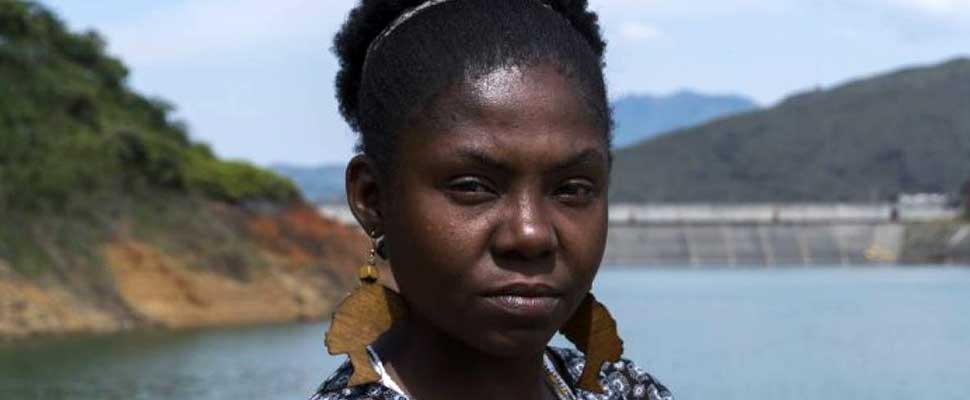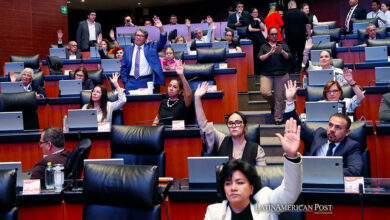What is the “Nobel” of Environment that a Colombian won? Does it do any good?
Francia Márquez was the only Latina to win the Goldman Foundation prize, known as the "Nobel" Prize for the Environment

 The Norwegian Nobel Committee, the Royal Swedish Academy of Sciences, the Karolinska Institute and the Swedish Academai award 6 Nobel prizes: Physics, Chemistry, Literature, Peace, Economics, and Physiology or Medicine. These are considered the most important awards in each of these fields. However, there is an award that is equated to environmental issues: the Goldman Foundation prize.
The Norwegian Nobel Committee, the Royal Swedish Academy of Sciences, the Karolinska Institute and the Swedish Academai award 6 Nobel prizes: Physics, Chemistry, Literature, Peace, Economics, and Physiology or Medicine. These are considered the most important awards in each of these fields. However, there is an award that is equated to environmental issues: the Goldman Foundation prize.
Leer en español: ¿Qué es el "Nobel" de Medio Ambiente que ganó una colombiana? ¿Sirve para algo?
This award was founded by Richard N. Goldman and Rhoda H. Goldman to give relevance to the planet's environmental problems and recognize those people who are struggling to save it. The Goldman Foundation has spent 28 years delivering this recognition to those defenders of nature and the environment in all regions of the planet: Africa, Asia, Europe, North America, Island Regions, and Central and South America.
This year's award in the Central and South American region is for Francia Márquez, an Afro-Colombian environmentalist who focused on fighting the illegal gold mining that is damaging land and rivers. The mining of this metal is being done with mercury, an immensely polluting and harmful material for the earth. The mercury that is used ends up in the rivers that ultimately end up in the seas and ends up contaminating fish, these fish also end up affecting the humans that consume them.
Additionally, several artisanal mines in Colombia are being dominated by illegal armed groups (including the ELN guerrilla group) to finance the purchase of arms and illicit activities.
Nohra Padilla, winner of the Goldman prize in 2013 for her fight for the management of garbage in Bogotá, expressed her satisfaction and pride in Márquez's achievement and assured that this will serve as a propulsion in the environmental fight of the new winner: "The prize also gives an economic value, but it is not a large amount, but it helps to sustain the struggle for a certain time.That at the same time drags new resources.The ones who are awarded have the possibility of having relevant information from the Goldman foundation. They introduce us to new contributors or to competitions or initiatives where we can introduce ourselves and obtain new resources.The award gives a seed so that around it new resources are obtained".
"In the case of our associations of waste pickers we have made progress in influencing public policies, which promote, not only the recognition of the recycler by trade, but to see changes in the model in the model of the presentation of the public toilet service and the use of waste, the recognition we have had, not only in Colombia, but in the world", Pradilla said.
In Latin America, it has been won by 3 Hondurans (including Bertha Cáceres in 2015), 2 Salvadoreans, 4 Mexicans, 5 Colombians, 1 Cuban, 3 Puerto Ricans, 3 Ecuadorians, 5 Peruvians, 1 Bolivian, 2 Paraguayans, 1 Argentine, 1 Chilean, and 3 Brazilians (including Marina Silva, former presidential candidate and former Minister of the Environment).
These awards manage to give this importance to the winners. Several of these environmentalists who have obtained the award, have leaned towards politics and have ended up as ambassadors, members of the government, and even presidential candidates like Marina Silva in Brazil.
The other winners this year were Clarire Nouvian of France, for their struggle to save the oceans and seas from destructive fishing; Makoma Lekalakala and Liz McDaid in South Africa for stopping the massive nuclear agreement between this African country and Russia; Manny Calonzo in the Philippines, to stop the production of lead paint; Leeanne Walters in the United States, who led the citizen movement that evaluated water in Flint, Michigan; and Khanh Nguy Thi of Vietnam for their efforts in the implementation of renewable energies in their country.
Latin American Post | Santiago Gómez Hernández
Translated from "¿Qué es el "Nobel" de Medio Ambiente que ganó una colombiana? ¿Sirve para algo?"





